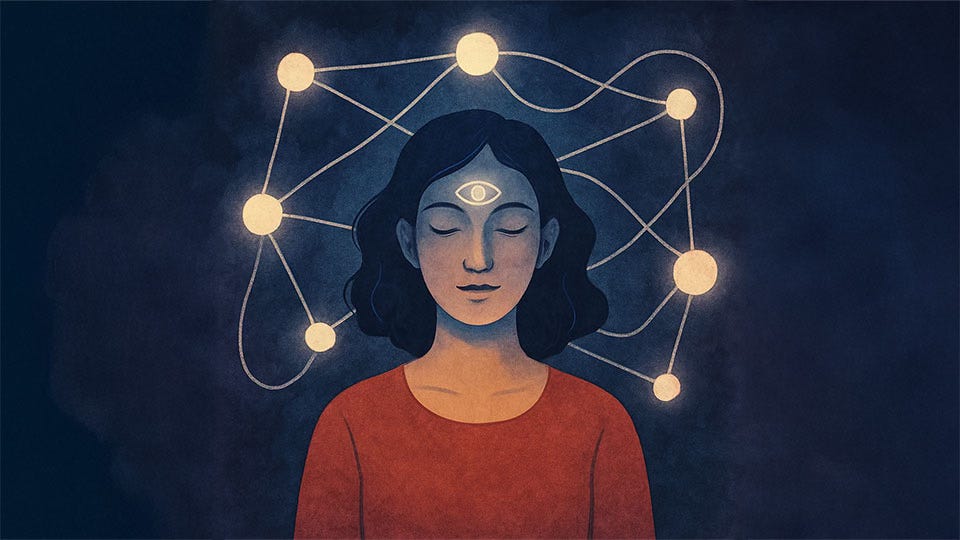Untuition: Are We Drowning Out Our Gut Instincts?
In a world dominated by dashboards, metrics, and now machine intelligence, a quiet shift might be underway — one that goes unnoticed until the consequences are personal. Are we in an age of untuition?
The word occurred to me as I thought about how important intuition is to me. I then reflected on people I’ve met who seem to have a deficit of it, which made me wonder what the opposite of intuition is. And so Untuition was coined.
Time to Focus or Time to Explore?
Initially, I was thinking about people who don’t (seem to) reflect on - or look for - the bigger picture or alternative possibilities in a situation. Of course, sometimes we need to laser focus and do some completer-finishing. In the past, I might have pointed to a lack of curiosity or critical thinking. Maybe it’s borne of an over-reliance on ‘best practice’ or pre-determined responses, rather than ‘trusting one’s gut’ or looking for different solutions.
Today, though, untuition might also refer to the gradual erosion of our ability to trust our instincts — a byproduct of outsourcing too much of our decision-making to data, algorithms, and external validation. I’m not against the use of data, obviously. That would be ridiculous. Facts, measurements, and outcomes are the point of much of what we do. I’m wary, though, of imbalance: when the scales tip too far away from the wisdom in our gut.
The Illusion of Certainty
Whether it’s Spotify recommendations, Chat GPT or other peoples’ sales forecasts, AI and data models are increasingly embedded in our lives. They can help us optimise, predict, and streamline. They remove uncertainty — or rather, can create the illusion that we have removed uncertainty.
Note how unequivocal ChatGPT can be - until you point out something that is categorically incorrect in its output. The quieter, more nuanced voice of the gut could easily be drowned out.
In business, this tension is especially palpable. The Great Founders of Legend would make moves based on hunches, vision, or what “felt right.” Now, decisions are expected to be data-backed — every pivot justified by a chart, every innovation A/B tested. While data can reveal patterns, it rarely tells the whole story and is, naturally, skewed to what happened (in the past). It’s not such a great guide when we want to create something new. Furthermore, data doesn’t tell you why a situation is as it is, or explain why people have made the choices they have. It just tells you what those choices or actions are.
Sometimes, your gut knows something your metrics haven’t caught up to yet.
When Intuition Matters Most
Intuition isn’t magic. It’s the synthesis of experience, pattern recognition, and emotion. Sometimes it happens in real time, often it’s a process that goes on in the background of your thoughts.
It’s what helps a seasoned negotiator sense that something is. off in a deal, or makes a designer feel when a product isn’t quite right — even if users haven’t complained (yet). It’s what flags up the fact that we’re looking at the wrong problem, not taking a broad enough perspective, making unjustified assumptions about cause and effect, or not looking for ways to change the game rather than just tweak the details.
In moments of uncertainty or novelty — when past data isn’t enough to predict the future — intuition becomes not just useful, but essential. It gives us the courage to take leaps that logic alone might veto.
Untuition creeps in quietly. It shows up when we over-rely on what can be measured, and undervalue what can’t. It’s the paralysis that comes from conflicting inputs. It’s the analysis fatigue or overwhelm that causes us to ignore our gut, not because it’s wrong, but because it’s unverifiable.
Trust, But Verify Too
This isn’t a call to abandon data or AI, but to (re)calibrate our relationship with it. Data should inform, not dictate. AI should assist our thinking and analysis, not replace them. And intuition should be treated as a valid — if complex — form of intelligence.
Here are a few ways to guard against untuition:
• Research widely and seek out diverse inputs. You need to be ready to see things differently.
• Create space for reflection. Insight usually arrives in stillness, not in spreadsheets.
• Ask what the data isn’t telling you. Every model has blind spots. What’s missing?
• Listen for the “yes, but…” moments. When your gut protests despite good-looking numbers, that friction deserves investigation.
Asking the Right Questions
As we move deeper into a world shaped by AI, the most effective leaders and practitioners won’t just be data-savvy — they’ll be deeply intuitive. They’ll know when to trust the model and when to go off-script. They’ll recognise that while data is great at answering questions, intuition is often what helps us ask the right ones.



